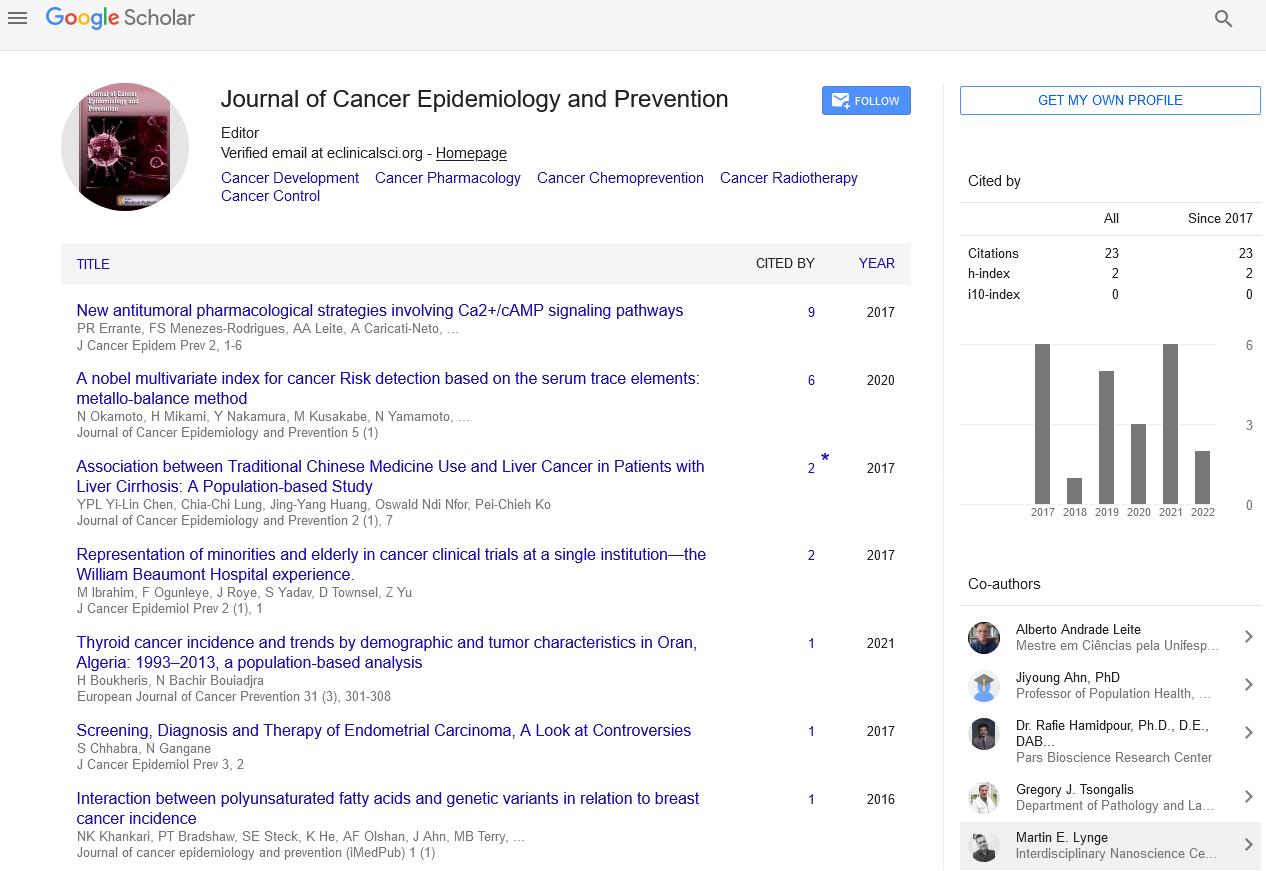Opinion - (2025) Volume 10, Issue 1
A Vital Awareness Note on Mouth Cancer
Megha Ramaswamy*
Department of Oncology, Gcri University, Gujarat, India
*Correspondence:
Megha Ramaswamy, Department of Oncology, Gcri University, Gujarat,
India,
Email:
Received: 19-Mar-2024, Manuscript No. IPJCEP-24-19253;
Editor assigned: 21-Mar-2024, Pre QC No. IPJCEP-24-19253 (PQ);
Reviewed: 04-Apr-2024, QC No. IPJCEP-24-19253;
Revised: 24-Mar-2025, Manuscript No. IPJCEP-24-19253 (R);
Published:
01-Apr-2025, DOI: 10.36648/ipjcep.10.1.45
Introduction
Mouth cancer, also known as oral cancer, refers to a malignant
growth occurring in the oral cavity, including the lips, tongue,
gums, floor or roof of the mouth, and the inner lining of the
cheeks. This form of cancer can affect anyone, regardless of
age, gender, or lifestyle. However, certain risk factors, such as
tobacco and alcohol use, Human Papillomavirus (HPV)
infection, and excessive sun exposure to the lips, can
significantly increase the likelihood of developing this disease.
The prevalence of mouth cancer is notably higher in
individuals who smoke or consume alcohol regularly, but it
has also been rising in people who do not engage in these
behaviors, particularly due to the growing impact of HPV. In
fact, HPV-related mouth cancer has become a significant
public health concern in recent years, especially among
younger individuals.
Description
In addition to the common risk factors, poor diet, particularly a deficiency in essential nutrients such as vitamins A, C, and E, can also increase susceptibility to mouth cancer. People, who are immune-compromised, such as those living with HIV/AIDS, are at higher risk due to their weakened immune systems. It is essential to address these risk factors by promoting healthier lifestyles, including maintaining a nutritious diet, regular exercise, and a routine dental care regimen.
Early detection is crucial in the successful treatment of mouth cancer. Therefore, it's essential to be aware of the signs and symptoms, which may include:
• Persistent mouth ulcers or sores that do not heal within a few weeks.
• Red or white patches in the mouth or on the lips.
• Persistent pain or discomfort in the mouth or throat.
• Difficulty chewing, swallowing, or speaking.
• A lump or thickening in the mouth or neck area.
If you experience any of these symptoms, it's imperative to consult a healthcare professional promptly. Early intervention can significantly improve the chances of a favorable outcome, as mouth cancer is often more treatable when diagnosed in its initial stages. Regular self-examination and awareness of your oral health can also help in the early detection of changes that might indicate the presence of cancer. Encouraging individuals to perform monthly oral self-exams to check for any abnormalities is a proactive approach to identifying potential signs of mouth cancer.
Prevention plays a pivotal role in reducing the risk of mouth cancer. By adopting a healthy lifestyle and avoiding risk factors such as tobacco and excessive alcohol consumption, you can significantly lower your chances of developing this disease. Eating a balanced diet rich in fruits and vegetables, staying hydrated, and practicing good oral hygiene are all important steps to maintain overall oral health. Additionally, regular dental check-ups can aid in the early detection of any abnormal changes in the mouth. Dentists are trained to spot early signs of oral cancer and can help facilitate early treatment when necessary. It is also important to protect the lips from excessive sun exposure by wearing sunscreen or lip balms with SPF protection.
Support and understanding from friends and family are invaluable for those affected by mouth cancer. If someone you know is battling this disease, offering your empathy and assistance can make a significant difference in their journey toward recovery. Emotional and psychological support is just as crucial as medical treatment, and ensuring that the person has access to necessary resources, including counseling and support groups, can contribute to their well-being. Many organizations offer support networks for individuals and families affected by cancer, which can help alleviate feelings of isolation and provide valuable resources.
Mouth cancer treatment depends on the cancer's location, size, and stage of progression. Common treatment options include surgery, radiation therapy, and chemotherapy. Advances in treatment, including targeted therapy and immunotherapy, have improved survival rates for many individuals diagnosed with oral cancer. However, prevention and early detection remain the most effective strategies in the fight against mouth cancer.
Conclusion
Let us all commit to raising awareness about mouth cancer, promoting prevention measures, and supporting those affected by this condition. With advancements in research and treatment options, the survival rates for mouth cancer continue to improve. By making informed lifestyle choices, conducting regular health checks, and spreading awareness, we can contribute to a future where this disease is detected early and treated effectively, ultimately improving outcomes for all. Working together, we can empower individuals to take charge of their oral health and reduce the global impact of mouth cancer.
Citation: Ramaswamy M (2025) A Vital Awareness Note on Mouth Cancer. Am J Cancer Epidemiol Prev. 10:45.
Copyright: © 2025 Ramaswamy M. This is an open-access article distributed under the terms of the Creative Commons
Attribution License, which permits unrestricted use, distribution, and reproduction in any medium, provided the original author
and source are credited.

